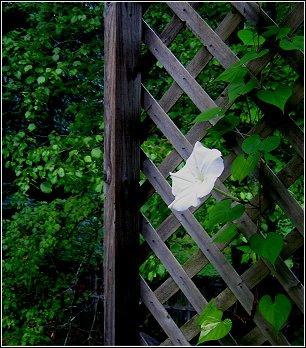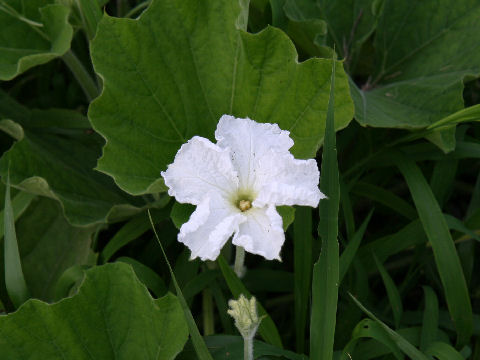04 — ゆふがほ (夕顔 / Yūgao)
"Evening Faces" (S)
"The Twilight Beauty" (T)
Comments:
Despite its comic moments, in the previous chapter there was something unsettling in the image of an empty cicada shell and other Buddhist imagery. This chapter, permeated with foreboding (the yūgao flower itself evokes images of glowing a pale if not deathly white in fading evening light), situates Genji in a tangle of relationships with women that he is managing badly: he carries a guilt about his secret affair with Fujitsubo and believes that perhaps the death of Yūgao is retribution for that improper love (Seidensticker 73: "He was being punished for a guilty love"), he gains Rokujō's bed only to "cool" to her afterwards (Seidensticker 63) and it is perhaps her spiteful spirit who kills Yūgao, Yūgao herself, discovered on his way to Rokujō's place, is his best friend's abandoned companion, and Utsusemi seems a symbolize how relationships are, in fact, out of reach for him. (Aoi, too, though his wife, is distant.) The view of amorous relationships in this chapter is definitely one that emphasizes the suffering involved while showing the very handsome, 17-year old Genji as elegant in manner but actually inept at matters of the heart. (Besides these relationships about which we know, there are others: "He was kept busy and unhappy by affairs of his own making" Seidensticker 62.)
Yūgao is one of the most yielding, gentle, alluring women of the tale, perhaps in keeping with the imagery of the yūgao flower with its short bloom time and curling, embracing ivy-type growth pattern. She is 19, a couple years older than Genji, but both erotic and innocent in manner. ("Though there was a certain vagueness about her, and indeed an almost childlike quality, it was clear that she knew something about men." Seidensticker 65) However, her decision to send out a poem on a fan as well as her sending spies to follow Genji to try to find out who he might be (Seidensticker 65), suggests a type of strength behind the slight, frail frame and easy-going demeanor.
Rokujō makes her first appearance in this chapter. Perhaps this is even her first murder. Unlike the other women of the tale, as Enchi Fumiko observed, the origins of the Rokujō-Genji affair are not shown to us.
Story highlights:
Genji's interest is captured by a run-down house in which it seems likely that a beautiful lady lives. She, for her part, sends out a poem to him on a scented fan, (a very forward act for a woman and perhaps one that is punished in the narrative).
In time their relationship begins. Interestingly, each hides his identity from the other (including hiding the face).
One night (the full moon of the 8th month, an important date on the lunar calendar and in Heian narratives) he takes her to a unfrequented location and the next night she is attacked and killed by a spirit, a beautiful woman phantom who tells Genji that she is angry he ignores her while spending time with a woman who is nothing special. Genji is beside himself with grief.
After her death he learns that Yūgao has given birth to Tō no Chūjō's child, a beautiful girl whose whereabouts are currently not known. She will return to the narrative later.
We also learn that Genji has seduced, then lost interest in Rokujō.
At the end of this chapter he exchanges poems with Utsusemi, who is leaving for the provinces with her husband and Nokiba no Ogi, who has made what Genji thinks is a strange married to a guards lieutenant.
Reading notes:
Seidensticker 57 menoto: a man's nurse (or wet nurse) was someone who generally had excellent family, strong devotion to the family she served, and political savvy. She was picked with care and is often described in reverential or respectful or especially warm terms.
Seidensticker 62-63: Genji's beauty is well described around her.
Seidensticker 65: It is on this page that the regular visits by Genji to Yūgao begin. It is often hard to identify these sorts of events in this narrative; they are very delicately conveyed.
Seidensticker 72 / Tyler 7268 "don't do this awful [Tyler: "terrible"] thing to me" .... Genji imploring Yūgao not to die. In either English phrase it sounds more selfish than in the Japanese. It is selfish, but not as irritatingly, entirely selfish: あが君、生き出でたまへ、いといみじき目な見せたまひそ.
Seidensticker 73: ... On the same point, again, when reading Genji's reaction to her death as a challenge to his reputation, it is easy to misread. He is thinking that he has done something awful with Fujitsubo, that Yūgao's death is a result of that, and that more terrible retributions are certain to be his fate and he is very afraid of the extent of those future punishments.
Seidensticker 74 Yūgao's beautiful corpse: This is an early in the narrative example of Murasaki Shikibu's readiness to see something attractive in the frail, sick and deceased. (The most famous scene will be Murasaki no Ue's death face.) Aileen Gatten called this Murasaki's "beauty of the moribund".
Multimedia:
Yūgao, 夕顔. Literally "Evening Face". Also called moonflower. It is a type of gourd-producing vine. In the Heian period it referred to a group of similar flowers, but all bloomed white. Sometimes listed as lagenaria siceraria but it may not be used with this much specificity in The Tale of Genji.

